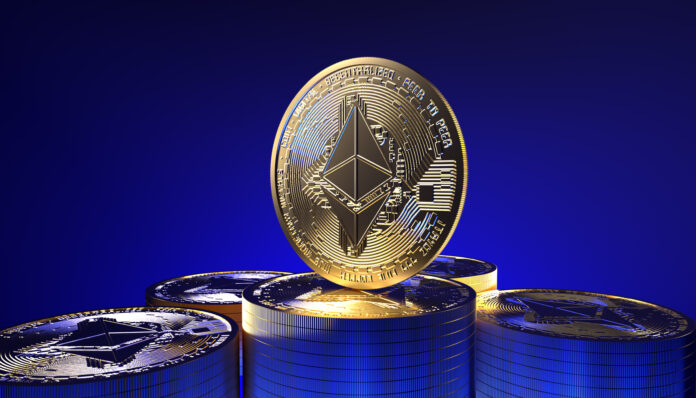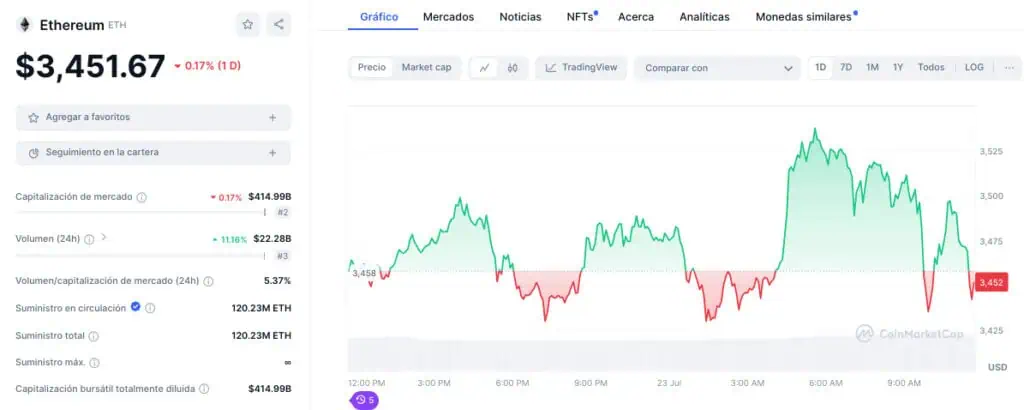
Eric Balchunas, Bloomberg ETF analyst, highlighted the first minutes of trading of Ethereum spot ETFs in the US market as a milestone for the second most capitalized cryptocurrency in the world.
Balchunas commented that Ethereum spot ETFs reached a trading volume of $112 million dollars during the first 15 minutes of its day on July 23, which it described as “a lot”, compared to the debut of traditional exchange-traded funds.
To provide context, the ETF analyst noted that BlackRock's manufacturing-themed ETF, MADE, which launched last week, generated $300.000 in trading volume on its first day of trading, while the Ether spot ETF of the company obtained 100 times this amount in its first 15 minutes on the market.
Balchunas also highlighted that the trading volume recorded by ether funds in their first minutes exceeded the expectations of analysts and experts, reaching close to 50% of the volume seen in Bitcoin ETFs.
Investors have a big appetite for Ethereum
From the first minutes of trading, Ethereum ETFs demonstrated significant interest from investors. So far, according to data shared by analysts, among the most traded funds are those of asset management giants Grayscale, Bitwise and BlackRock, followed by Fidelity, VanEck, Invesco Galaxy, Franklin Templeton and 21Shares.
All of these funds began trading today, July 23, after the United States Securities and Exchange Commission (SEC) gave the green light to their launch after months of speculation and expectation in the market.
Transparency in crypto investment
Bitwise, one of the most innovative ETF issuers in the crypto space, has taken additional steps to increase transparency and support for the Ethereum ecosystem.
The firm recently announced the Ethereum addresses where its spot ETF assets are stored, becoming the first fund issuer to do so. In addition to this, Bitwise highlighted in X that has implemented ENS (Ethereum Name Service) domain names for each address, making it easier for the public to verify the fund's assets.
In an unprecedented move, Bitwise also pledged to donate 10% of your Ethereum ETF profits, which trades on the New York Stock Exchange under the ticker ETHW, to the open source development of Ethereum.
This donation will be made annually for at least 10 years and will go to key blockchain ecosystem organizations, such as the Protocol Guild and PBS Foundation, that support cryptocurrency developers and research into blockchain improvements.
According to Hong Kim, CTO of Bitwise, the donations are part of the company and ETHW investors' commitment to the development and evolution of the Ethereum network.
ETH price remains static
At the time of writing this article, the launch of Ethereum ETFs has generated a significant impact on the price of the cryptocurrency, which is trading above $3.450 per unit.

Source: CoinMarketCap
According to the platform's chart, the price of Ether briefly exceeded $3.500 in the early hours of the 23rd, and then corrected above $3.450. ETH trading volume currently exceeds $22.000 billion, showing 11% growth in the last 24 hours.
Experts anticipate that the launch and listing of spot funds in the US market will generate a positive effect in the long term in the price of the cryptocurrency. Matt Hougan, CIO of Bitwise, suggested that these exchange-traded funds could boost the ETH price to new all-time highs before the end of 2024. Among other estimates, some analysts consider that the cryptocurrency will reach $6.500 per unit in the coming months.
However, it is important to highlight the differences that exist between Ethereum and Bitcoin in the context of spot ETFs. While Bitcoin is primarily viewed as a monetary asset and store of value, Ethereum is seen as the foundation for many decentralized applications, including decentralized finance (DeFi) protocols, non-fungible tokens (NFTs), and stablecoins. This diversity of uses could attract a broader group of institutional and retail investors through exchange-traded funds, which offer investors a regulated and easy way to gain exposure to cryptocurrency without needing to directly purchase and store it.



